A Diplomatic Life: Ambassador Matt Murray ’95
From Baltimore to Beijing and many cities in between, an alum’s career straddles the globe.
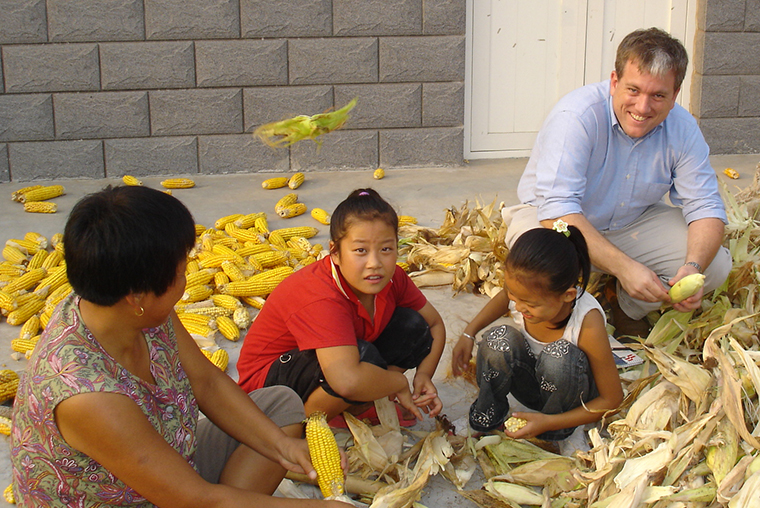
By Todd Farley
Ambassador Matt Murray '95 parlayed a bachelor's degree in political science and international studies into a career as a globe-trotting American diplomat. And now, as the U.S. Ambassador to the Asia-Pacific Economic Cooperation (APEC) inter-governmental forum, he is a regular participant in high-level meetings between world leaders. He was in the room when President Biden met with Canada's Justin Trudeau and China's Xi Jinping at the organization's Leaders' Summit last fall.
“It was one of the coolest things in my career to be in the Leaders' Summit, with Presidents Biden and Xi sitting at the table where I was,” Ambassador Murray says.
The 21 members of the APEC collective include countries like the United States, Canada, China, Japan, Vietnam, Thailand, Malaysia, Australia, and Papua New Guinea, which is why the Ambassador brands it a “miniature United Nations.” That characterization isn't hyperbolic; the organization's member economies account for 50% of global trade and 60% of global GDP.
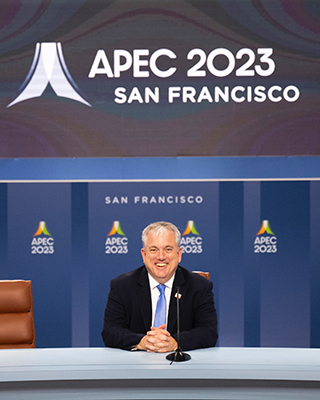 “APEC works towards cooperation in a wide range of [economic] policy areas: trade,
transportation, energy, disaster management, health, finance, and food security, to
name a few,” Murray explains.
“APEC works towards cooperation in a wide range of [economic] policy areas: trade,
transportation, energy, disaster management, health, finance, and food security, to
name a few,” Murray explains.
The organization doesn't get involved with non-economic issues even amongst its member countries though. For example, the dispute in the South China Sea between China and the Philippines isn't in APEC's purview.
“The U.S. and our allies work together to express our concerns on the South China Sea through other bilateral and multilateral mechanisms, including through the Association of Southeast Asian Nations (ASEAN),” Murray says.
Now based in Singapore, Ambassador Murray's intercontinental travel began with a considerably shorter trip—from one part of Maryland to another. He grew up in the Baltimore suburbs and imagined graduating from a large university, perhaps the University of Pittsburgh, but a single visit to Washington College changed everything.
“It was love at first sight,” he says. “The community, the sense that everyone knew everyone, that the professors knew the students, that there was the opportunity to do things like both be a serious student and play intercollegiate sports.”
Although he graduated in three years, Murray took advantage of those opportunities at the College, playing varsity soccer, joining the Kappa Alpha fraternity, editing the sports section of The Elm, and working in the college's sports information department. “It was a really good experience being able to do a lot of different things,” he says.
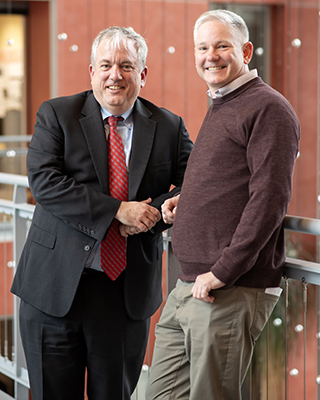
More than anything else, it was the professors who mentored him at the College who shaped Murray into the man who would spend some 25 years working for the U.S. State Department. Dan Premo, chair of international studies at the time, was his first mentor, and Ambassador Murray took at least seven classes with him. Then, in his senior year, Murray's career trajectory was fully launched when Professor Tahir Shad wrangled an internship for him in Indonesia. (Shad secured overseas internships for all eight other students doing international studies that year as well).
“My initial charge was to build an international studies program and to create opportunities for internships and study abroad,” Shad says. “And Matt was a bright student who always struck me as a go-getter and hard worker.”
Murray was grateful to Shad for the internship, but he'd never traveled outside the United States and wasn't exactly sure what he was getting himself into. “I mumbled some thanks to Dr. Shad, then went to the cafeteria to ask my classmates if any of them knew where Indonesia was,” the Ambassador admits.
Three months in that country were all Murray needed. “I was totally captivated by Asia, and my career headed in that direction.”
After earning a master's degree from the U.S. Army War College and the University of Pittsburgh, Murray joined the Presidential Mansion Internship Program and started working for the Immigration and Naturalization Service in 1997. After passing the Foreign Service exam, he joined the State Department in 1998, where he has been ever since.
As a State Department diplomat representing the United States, Murray moved some 11 times to and from six different postings, including New Delhi, Dar es Salaam, Shanghai, and Beijing. Through all these moves and postings, Murray was accompanied by his wife, Sharla Ponder Murray '95—they met and began dating during their first year at the College. After marrying, the two alums considered doing overseas work together, perhaps in the Peace Corps, but neither imagined an entire international career.
“We had discussed going abroad but thought it would only be a few years,” says Sharla Murray, who worked as a liaison officer at many of the Ambassador's posts. “Instead, we got a few tours in the Foreign Service and ended up enjoying the experience as a family. I don't think we could have planned the life we've had, but it has been an amazing journey.” According to both, their three sons enjoyed an upbringing in one international locale after another.
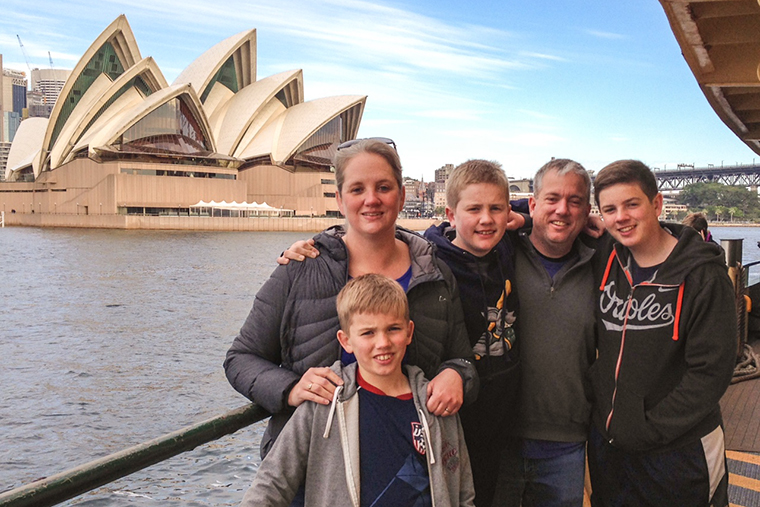
“I couldn't have asked for a better partner in life and in the Foreign Service than my wife, Sharla,” the Ambassador said at his swearing-in ceremony in 2023. “And thanks to our three boys—Joshua, Noah, and Daniel—who not only survived the State Department lifestyle but thrived.”
Even with all their international journeys, the Murrays never forgot where it all started for them. “Sharla and I feel very deep connections to the College and to Chestertown, which is why we decided to get married at First United Methodist Church on High Street and why we've made many trips back to campus over the years, including with our kids,” the Ambassador says.
“The story of my career all starts here and is about what these professors have created over the last three or four decades,” Ambassador Murray recently said when on campus for a visit. “I really felt I was mentored and cared for here by my professors, both professors Premo and. Shad, who have had a really big influence on my life.”
Those lessons are certainly not lost on the College's current students. As Will Granados '25, a double major in political science and anthropology, says, “It's great to see a guy go from a relatively small school and become a big name at an organization such as APEC, and it's amazing to hear about how Washington College got him there.”
Ambassador Murray is justly proud of the many accomplishments he helped the United States achieve during his career, but his international lifestyle included many personal thrills as well. He recalls “incredible” safaris in Tanzania, trips with his family to the Ming Tombs outside Beijing, and playing “football” (as the world calls soccer) on the beach in Indonesia and even in diplomatic leagues in India, where the games rarely went in the Americans' favor.
“We played the French and British and Canadians and got trounced all the time,” Murray shrugs.
As well as learning to be graceful in defeat on the soccer field, American diplomats and their families face other challenges living overseas. Murray says the United States Foreign Service is always “hypersensitive” to the rituals and customs of the places where its embassies are located. Which meant he was always trained in local etiquette before a posting so as not to make any cultural faux pas.
“You always wanted to make sure you were drinking your tea properly, for instance, or that you weren't blanching when you realized just how much sugar was in it.”
If adapting to local customs was difficult enough, maneuvering his way through what Murray calls the U.S. government's “hierarchical bureaucratic structure” wasn't easy either. At his first posting in India, he was responsible for an aspect of President Bill Clinton's state visit. He fulfilled his duties diligently, in his opinion, and being young and inexperienced, he thought it would be fine to take a weekend trip with family and friends just before the President's visit. It was a decision that hardly thrilled his boss at the embassy, who had to field the calls from the President's team in his absence.
“She was mad, saying there were calls over the weekend that I should've been around to take care of.”
The September 11th attacks occurred when Murray was the acting consular officer in Dar es Salaam, Tanzania. Because flights from Kilimanjaro International Airport to Amsterdam were canceled, some American citizens en route to the United States were offloaded in Dar es Salaam without explanation. In a time before smartphones and televisions on airplanes, Murray was the one who told his unsuspecting countrymen about the attacks in New York, Washington, and Pennsylvania. He was also responsible for those U.S. citizens suddenly stranded in Africa, their transportation and housing, and their easy access to information and communication.
“That was very weighty early in my career, realizing that you're there to protect Americans, to be able to speak on behalf of the United States government, and be able to help U.S. citizens.”
Ambassador Murray's career eventually took an economic turn. He's been counselor for economic affairs at the U.S. Embassy in Canberra, Australia; the minister counselor for economic affairs in Beijing, China; and deputy assistant secretary of state for trade policy and negotiations in the State Department's Bureau of Economic and Business Affairs. The work has all been aimed at improving economic relations between the U.S. and the world (especially the Indo-Pacific region) and has entailed things like creating jobs and opportunity in Tanzania through the Africa Growth and Opportunity Act, expanding innovation in Australia, and re-opening supply chains after the Covid crisis.
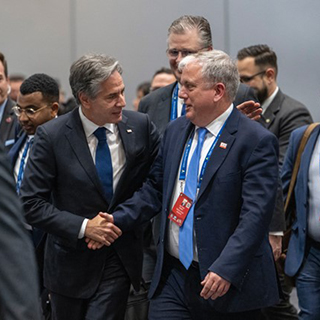
Today, Murray is the U.S. senior official for APEC, a position which, after President Biden's nomination and the U.S. Senate's confirmation, earned him the title of Ambassador.
The Ambassador says it's vital as a U.S. diplomat to always represent American values—whether that's maintaining a strong stance against political repression in Burma or human rights violations in China—but also that the rights of American citizens and companies have to be protected, too.
“You have to defend American interests, and if U.S. companies and U.S. consumers are getting short-changed here because China is not following the same rules as everybody else, then you have to stand up and say, ‘enough is enough.'”
Murray admits that occasionally thorny diplomatic interactions with the Chinese over the years have been intellectually challenging.
“When I first went to China in 2004, they felt like a much poorer country, but now they don't want to be underestimated,” Murray said. “They want a seat at the table.”
Getting a literal and metaphorical seat at the table is where Murray's illustrious career has led. And to hear him tell it, that largely results from his experience at Washington College.